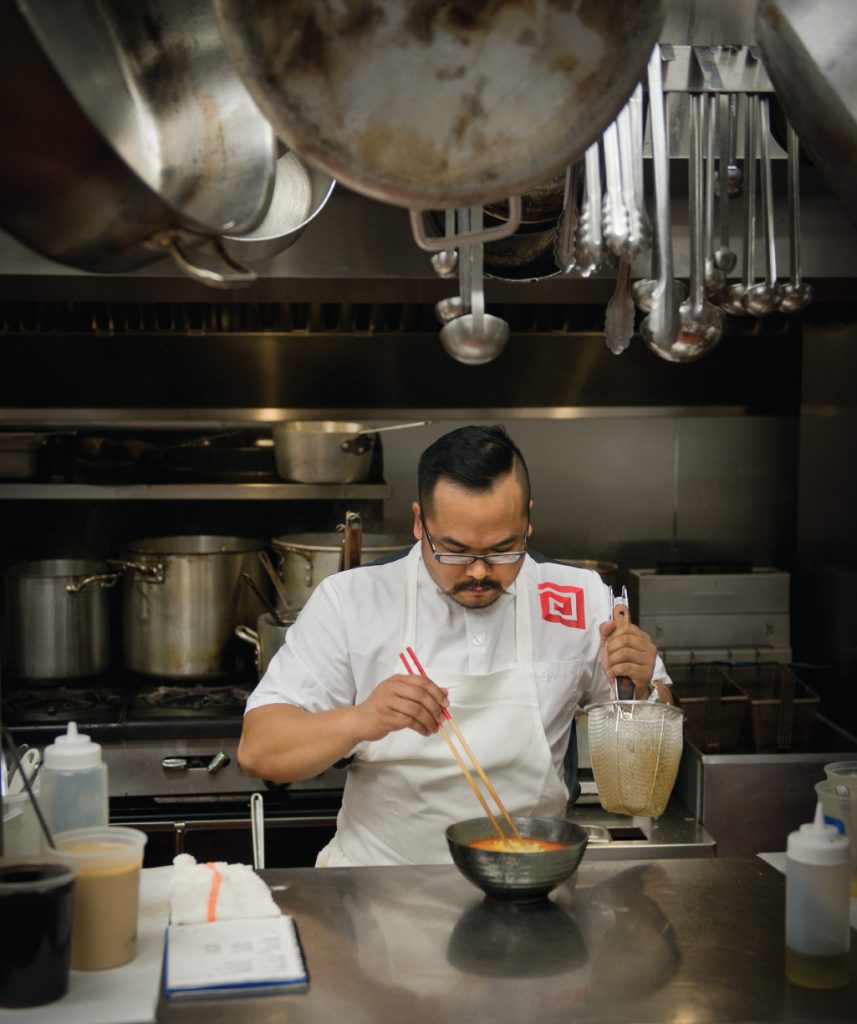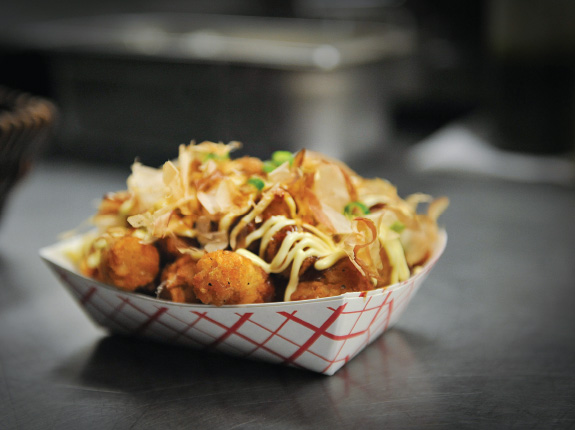The Shaman of Ramen
Animal, vegetable, mineral: Kevin Ordonez melds them in ways that keep Alkaline packed.
(Try the tater tots.)
Kevin Ordonez knows noodles. He knows broth and bones and aromatics, and how to cook pig feet at a ripping boil for days, until the calcium and marrow break down to create the milky white stock that is the base for his Tonkotsu ramen. He knows to pack a chicken carcass in ice and then raise the temperature slowly, accompanied by only colorless vegetables – garlic, leeks, onions, celery – so that the liquid remains clear, and he knows how to make ramen noodles with the high pH that will turn them yellow and, more important, keep them strong and bouncy in the nearly boiling broth.
“If I used regular spaghetti it would be mush by the time you got to the bottom of the bowl,” he says.
Ordonez, 27, is the owner of the pop-up ramen shop Alkaline, named for his noodles and based inside Pendulum Fine Meats in Ghent.
Ordonez is Filipino; ramen is Japanese. He trained in traditional French cooking styles at the Culinary Institute of America, and his food is centered on Asian concepts that he twists into something uniquely American.
“We are very, very nontraditional here,” he says. “I’ll base a dish on something from somewhere else – Filipino or Korean or Vietnamese – and say, how can we make this super weird? I want to give you something you know but not the way you know it.”
Take, for example, his version of Okonomiyaki, a Japanese pancake made of flour, scallions and pork belly that’s topped with Japanese barbecue sauce and Japanese mayonnaise, along with shredded nori and katsuobushi – tuna that has been smoked and dried until it’s rigid, then shaved into what some call bonito flakes. It’s a common street food in Japan, where Ordonez lived as a child, but he now puts those same toppings over that most American of creations: tater tots.
“I just took a common American thing and made it into a mutated Asian dish,” he says. “That’s how we develop our menu items.”
Alkaline is busy and loud, with music and laughter and the shouted conversations of the cooks in the kitchen as they craft steaming bowls of his weekly special, farmhouse ramen, pairing whichever vegetables are in season with whatever broth Ordonez thinks will make them delicious. Or he braises a brisket of Pendulum’s pasture-raised beef on low for six hours in a stock rich with warm spices like star anise, cinnamon and cloves, plus onion, celery, carrot, garlic, ginger, herbs and red wine, then slices the meat into a bowl of the broth and tops it with sautéed arugula, a sous vide egg, watermelon radishes, butter and fresh-cracked black pepper. The flavor is rich in umami.
Pendulum’s capacious kitchen bustles as employees swap the butcher shop’s sandwich fixings with their own ingredients and rearrange Pendulum’s product displays and tables to seat 36. The space is large for a noodle shop, yet there is often a line out the door. A chalkboard pops up on the sidewalk and a banner hangs on the side of the building when Alkaline is open – at night after Pendulum closes – but most customers are lured through word of mouth and vigorous campaigns on Facebook and Instagram.
“We use social media only,” Ordonez says. “My staff and I are pretty young. This is our generation of people who spend hours online every day, so why not take advantage of that for Alkaline?”
In the fall Ordonez coordinated a successful Kickstarter campaign that raised nearly $25,000 so he could open a restaurant of his own. In Japan ramen restaurants usually seat about 10 at a time, and the restaurant in his mind is in Ghent or Park Place, with a bar down its length, customers on one side, chefs on the other.
“Alkaline is super lively, super intense,” he says. “You come in for dinner and we’re playing loud music, there are people talking everywhere, you can hear us in the back shouting. I want that close, intimate exchange between the people cooking and the people eating. You talk to the chef, you build relationships.”
Ordonez grew up in a Navy family that spent six years in Japan and ultimately settled in Virginia Beach. At Tallwood High School, he took a cooking class purely to raise his faltering GPA. Soon he was flashing his knife skills in a competition put on by the Careers through Culinary Arts Program, demonstrating the tiny dice that is brunoise, the precise julienne of carrot, the turning and turning and turning to form the smooth seven-sided football of a tourne of potato. He then made a French omelette, pale yellow, without wrinkles or folds, the judges circulating. For his efforts he won a week of summer camp at each of the two titans of cooking schools at the time, Johnson and Wales in Charlotte, and the Culinary Institute of America in Hyde Park, New York. He competed again during his senior year, and won a full-ride scholarship to the CIA.
From there came a cooking career that took him to some of the best restaurants and catering companies on the East Coast, including a stint under Michel Richard, owner of the now-defunct Michel, in Georgetown.
“It was super hard core, like the TV show Hell’s Kitchen, but without the cameras,” Ordonez says.
Kevin Ordonez, Alkaline Ramen, Norfolk Va, Pendulum Meats, Virginia, Best Ramen in Hampton Roads, Distinction Magazine, Distinction
He returned to Virginia and worked at Todd Jurich’s and then Terrapin, but he couldn’t see a way to move up, so he started college, planning to abandon cooking, get a degree in finance and become a restaurant consultant. Still, the idea of running at least an occasional noodle shop lingered, if he could find someone to let him use their kitchen for a night. Then a friend introduced him to Matt Hayes, owner of The Cutting Edge in Chesapeake, a luncheon café with an empty kitchen at night, and Hayes was enthusiastic about giving Ordonez the opportunity.
“Bouncing ideas off another chef sparks a lot of creativity,” Hayes says. “Plus, we’re both around the same age, both looking to make a name for ourselves in the business and to cook good food, and we’re all about community and helping each other out.”
A friend who is a ramen fan fronted Ordonez enough money to buy stockpots and ladles, chopsticks and ingredients, and Ordonez began making noodles by day and serving them by night. The first dinner brought 100 reservations, all drawn in by social media. Some weeks later he had 190 reservations in an hour. He quit school because the restaurant was taking 90 hours a week.
Six months later he had the opportunity to move to Ghent, where the kitchen was bigger, and the community was more open to unfamiliar foods, and the people of Pendulum had the space and the
inclination. “It sounded interesting, like something we could do to give back to the community,” says Pendulum co-owner Dylan Wakefield. “We don’t lose money or employees, so there was nothing lost and a lot to gain, and this way we can promote new talent.”
Things have gone so easily that when Alkaline moves on, Wakefield and his partners will be looking for other chefs to help launch into Tidewater’s growing food movement.
Ordonez is looking for the real estate that says Alkaline to him. He considered moving to Richmond, a city somewhat ahead of Tidewater when it comes to food. But he decided to stay in Norfolk.
“This is a project I think is needed here,” he says. “The way we do our food, the feel of the restaurant. … Not very many here have our atmosphere and our menu selection and the way we think about food in general.”
“It’s not that we’re going to be a big savior of the city, but we’re definitely a small part of what will make this in the next 10 years a food-cultured city. The food scene here is being rejuvenated, and I think Alkaline will play a bit part in that movement.”
Originally published in DISTINCTION, May 16, 2015


